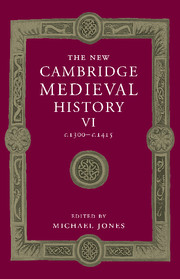Book contents
- Frontmatter
- Part I General Themes
- Part II The States of the West
- 13 The British Isles
- (a) England: Edward II and Edward III
- (b) The Reign of Richard II
- (c) Wales
- (d) Fourteenth-Century Scotland
- (e) Ireland
- 14 France
- 15 Italy in the age of Dante and Petrarch
- 16 The empire
- 17 The Low Countries, 1290–1415
- 18 The Iberian Peninsula
- Part III The Church and Politics
- Part IV Northern and Eastern Europe
- Appendix Genealogical Tables
- Primary Sources and Secondary Works Arranged by Chapter
- Index
- Frontispiece
- Plate section
- Map 4 Europe's trade, c. 1300
- Map 5 Europe's trade, c. 1400
- Map 7 The Hundred Years War to 1360
- Map 15 Russia, c. 1396
- Map 17 The Byzantine empire in the 1340s
- References
(b) - The Reign of Richard II
from 13 - The British Isles
Published online by Cambridge University Press: 28 March 2008
- Frontmatter
- Part I General Themes
- Part II The States of the West
- 13 The British Isles
- (a) England: Edward II and Edward III
- (b) The Reign of Richard II
- (c) Wales
- (d) Fourteenth-Century Scotland
- (e) Ireland
- 14 France
- 15 Italy in the age of Dante and Petrarch
- 16 The empire
- 17 The Low Countries, 1290–1415
- 18 The Iberian Peninsula
- Part III The Church and Politics
- Part IV Northern and Eastern Europe
- Appendix Genealogical Tables
- Primary Sources and Secondary Works Arranged by Chapter
- Index
- Frontispiece
- Plate section
- Map 4 Europe's trade, c. 1300
- Map 5 Europe's trade, c. 1400
- Map 7 The Hundred Years War to 1360
- Map 15 Russia, c. 1396
- Map 17 The Byzantine empire in the 1340s
- References
Summary
introduction
richard II slipped quietly into his kingship although his reign was to end much more decisively. Richard became obsessed, in a way that Edward III had not been, with the fate of his great-grandfather who had been deposed and murdered in 1327. In his attempts to prevent history from repeating itself, Richard provoked his great magnates into taking exactly that course which he most feared. Yet, in spite of their comparable ends, the reigns of Edward II and Richard II were very different. Unlike his great-grandfather, Richard had a strong character which included some attractive attributes such as bravery and loyalty. Moreover he developed and pursued policies which had long-term objectives and made sense nationally as well as personally. But Richard also lacked certain qualities which were essential for medieval kings: he did not enjoy real war and he got on badly with the English nobility as a group, although he was able to develop individual friendships with some of them. He was not ‘one of the lads’ in a way that Edward I or Edward III had been, nor as Henry IV and Henry V were to be later, and he had a suspicious and secretive nature which bred unease and insecurity in those around him. Medieval monarchy depended for its success upon the abilities of individual kings: the institution of kingship was not yet sufficiently developed to carry incompetent kings. Richard II had the wrong abilities for his inherited task.
- Type
- Chapter
- Information
- The New Cambridge Medieval History , pp. 297 - 333Publisher: Cambridge University PressPrint publication year: 2000
References
- 4
- Cited by

